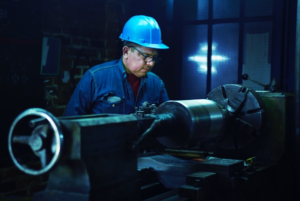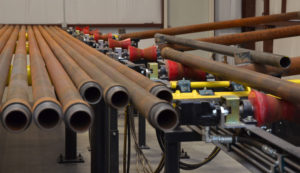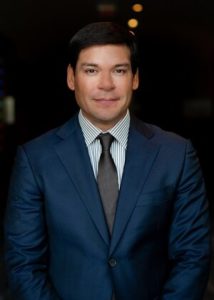The key words in today’s economic world would seem to include “disruption, adaptation, and creativity.” Nowhere are these words more pertinent than in the oilfield services sector. There, additional key phrases would be “burning iron” and “squeezing profits.” The three companies contacted for this article exemplify another word—“diversity”—as each has taken a different path to survival.
Supply Chain Economics
 In his previous position with a large oilfield service company, Advanced Oil Tools founder Bryan Fitzhugh became frustrated with how the industry had evolved. E&Ps, he found, were seeking to cut their costs by standardizing most drilling and completion methods, to “commoditize” them. When all procedures are the same on every well, the client can choose services simply based on price.
In his previous position with a large oilfield service company, Advanced Oil Tools founder Bryan Fitzhugh became frustrated with how the industry had evolved. E&Ps, he found, were seeking to cut their costs by standardizing most drilling and completion methods, to “commoditize” them. When all procedures are the same on every well, the client can choose services simply based on price.
This creates a price and profit squeeze for service companies.
The pressure of dealing with price competition for every job every day sent Fitzhugh packing. Taking several months off to consider options—including the possibility of leaving oil and gas altogether—he decided he had too much love for the industry and too much experience to leave it in the dust.
But survival would demand a different business model. As he stepped back to think, he realized what he—and the industry as a whole—needed to do.
“When major industries standardize, their supply chains industrialize,” he said. “That, in oil and gas, has not happened.”
His vision for how service companies could survive a price war would be to slash their overhead. They would no longer maintain a staff of engineers, nor would they hold in inventory a small count of parts and equipment. Instead they would farm those out to a company with significant economies of scale.
“When we talk to the service companies, these guys are trying to make money. So it’s actually a lot more fun, in this part of the market, to discuss how we go and make money with the service companies.”
Fitzhugh and his associates decided to become the top service company partner for “downhole completions, downhole well construction, and downhole production equipment.”
Their focus is on creating new technology, improving existing ideas, and creating those economies of scale on the manufacturing side.
To make that happen, Fitzhugh wanted to work with an established company that could handle both design and manufacturing of downhole equipment—on a scale that would allow for significant savings in overhead for both the manufacturer and AOT’s clients in the service sector.
“We ended up partnering with a company called J&P Industrial Services, who is a large ISO 9001:2015 certified manufacturing company,” said Fitzhugh. We gave them a piece of Advanced Oil Tools.” That partnership allowed Fitzhugh to immediately have a fully staffed and international quality manufacturing inventory management and distribution network ready to go to work for his clients.
And because the vast majority of J&P’s existing work is outside the oil industry, the company is easily able to withstand the sector’s massive economic swings.
“Through that partnership we were immediately in the business the day after we opened the doors,” he said. Between Fitzhugh’s own market credibility, developed over years in the business, and that of J&P, it gave AOT an instant launching pad.
Indeed, the company’s business model and ideas were immediately received very well upon opening in February. Then—COVID-19 happened.
Fortunately, by the time the latter half of the summer rolled around, service companies began reemerging from their shellshock and realizing that this could be exactly the right time to allow a firm like AOC to help them cut overhead.
Proprietary Products
Wildcat Oil Tools founder and President Aron Marquez also has a new vision for the service sector—with a different plan.
“I think it’s going to take new thinking to take the industry forward,” he began, listing shutdowns and the already-brewing dissatisfaction with oil and gas returns on the part of Wall Street investors among the “headwinds” that are pushing back on the industry.
Marquez has seen the same E&P moves toward standardization as Fitzhugh has, and has undertaken an alternate solution. “For us, over the last three years, we’ve changed our model,” he said. They have focused on creating proprietary technology that can be used in their locations around the world. Marquez stresses that they are still a service company first.
Wildcat has also faced the price-squeezed market in which profits are pushed to the breaking point—to the point of “burning iron,” or having to postpone repairs and maintenance on vital equipment. When service companies allow that kind of pricing, “That creates a problem for the market,” he observed.
During times of low prices, Permian Basin companies have to fight not only the general market—they also face an influx of other service companies that have flocked to Midland/Odessa from basins that are less active than the Permian. This oversupply of service companies creates even more downward price pressure as everyone fights for the business that remains.
Wildcat observed all this in the 2015-16 crash, and that’s when they decided to change the outlook.
Now, “We focus on products, new tools and technology. We can ship all over the world,” he said. “We’re working a project right now in Saudi Arabia, we’re working a project in South America, we just did a project in Argentina. We’re working on projects internationally because our proprietary technology opens the doors to other markets.”
He feels that any company focusing on service alone will face tough pricing competition for possibly 3-4 years. “So any differentiating factor you can provide the customer—you have to add some aspect of value-plus—aside from quality and safety.”
Pushing against differentiation is the concept of one service company presenting their entire service as a package, especially for coiled tubing or rigs. Larger service companies may be able to package everything needed for the job. Others, like Wildcat, may join together with one or more additional companies in order to provide a complete list of services.
Marquez noted that this format finds favor with E&Ps, because it allows operators to assign responsibility to a single entity no matter what problem may arise. He explained, “Let’s say you have a small leak, for example, in a manifold. Well, if that small leak shuts down the entire operation, the operator’s not going to to pay anything for that, because you own the whole thing.”
To deal with these costs, the service company then pays its own employees hourly instead of by the job—which can cause workers with years of experience to walk out the door.
The slowdown in activity has led to widespread layoffs already, he pointed out. Often the first wave of layoffs is absorbed by the newer, less-skilled workers. That means a job that previously would have been staffed by a supervisor and three crewmen is now staffed by three or four supervisor-level people—a configuration that does mean that everyone on site is experienced, although they may not be doing their usual job.
More new ideas may be necessary for survival and, hopefully, growth. “The good thing about our industry is that, regardless of how long we’ve been doing this, everyone’s so open-minded and willing to change to take advantage of the technology that’s out there. I love that.
“That’s the open-mindedness it’s going to take to move everything forward. Our industry’s pretty resilient and we’re going to adapt to whatever’s expected of us.”
Broadening the Market through Diversification
Diversification is a third option, and Shreveport based Target Oilfield Services, LLC is taking that direction. CEO Joe Valentine, who joined the 10-year-old company in 2017, says they’re taking an organic approach to diversifying. That includes varying both what they do and for whom they do it.
“How are we adapting to the current marketplace? We’re diversifying our clientele—not only the services we offer, but in what realms we offer those services,” he explained. “That’s a basic financial concept that everyone should understand, but doesn’t always apply in practice.”
With a background in finance and accounting, Valentine says he makes every decision based on those kinds of values, and teaches his workforce to think the same way. With so many companies writing for whom the next chapter of their story involves the numbers 11, 7 or 13, Valentine’s approach would seem to have great merit.
He sees many peers “double down” in just the oilfield, over-leveraging their assets to stay afloat in that single area. But when clients change their pay terms from 30 or 60 days to 90 or 120, as is happening across the board in the COVID-19 context, that leverage becomes much harder to sustain as cash flow shrinks. Even for all that—“this is the oilfield”—he noted, things are still a challenge.
He credits his collections manager as a key to good cash flow. “She collects things I never thought we would see.” Some debtors have gone out of business still owing Target money. In that situation there is little hope for being paid.
Valentine describes Target as a “small oilfield service and rental company.” They provide containment rentals, poly urea coatings for pipelines, and “pretty much anything someone needs to coat.” Target also provides shower trailers, flowline safety restraints, cool-down trailers, small equipment rentals, and services.
In addition to equipment rentals, the company has recently branched out into construction and contracting for pad sites. Construction and poly urea coatings are the main areas where they’ve diversified outside of the oil patch. Already moving that direction before COVID-19, the virus-related downturn sped up their process, Valentine acknowledged.
“We’ve developed some expertise in specialty coatings, and we work in the commercial, industrial, and residential spaces. In the Permian, we work mostly in just oil and gas and industrial,” he said.
Diversification has to be within reasonable parameters. “When we do diversify, we have to ask the question, ‘What are our skillsets and where can we apply those skillsets?’ It would be much different if we said we were going to open a restaurant—that doesn’t make any sense,” he joked.
As a relatively small company, all employees are able to be generalists—working one day on a construction site and the next day on an oil and gas site. With a certain amount of growth, Valentine says that will become impractical, but in this economic environment it has been a key to the company’s survival and success.
Resiliency is yet another key word today, and these three companies typify how that’s working for others in the sector that are surviving. That and keeping a realistic view of finances are helping these firms move ahead.
Target’s Joe Valentine overheard an employee’s phone call with a wise uncle, who told his nephew, “Son, you’re spending all this money. Look at yourself in the mirror! You can’t be walking around with no money in your pocket!” (The employee knew Valentine was in the room).
“I laughed so hard at that,” Valentine said, “because that’s a summary of my philosophy.”
_____________________________________________________________________________________________________
Paul Wiseman is a freelance writer in the oil and gas sector.










